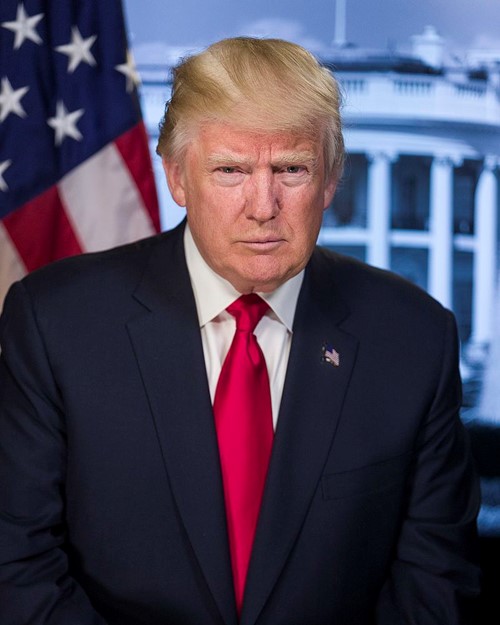Trump's policies - method or madness?
By Frieda Park
The media has been awash with further revelations about Donald Trump’s personal behaviour and capricious style of doing politics. Figures close to him have been embroiled in court cases and investigations which implicate him in wrong-doing. Moral outrage is the currency by which he is critiqued.
His visit to Britain in July was met by large demonstrations. Though speakers at the rallies made sound political points the visual images were of protesters all too often carrying placards with slogans attacking him personally and vying for who could use the most offensive language, making it an unsuitable place to introduce your child to political activity. The inflatable baby Trump flying over London was no better. The anti-Trump protest was made to look childish and self-satisfied. Moral outrage which did not reach the moral high-ground.
Donald Trump is a very dangerous man. Belittling him personally detracts from understanding that fact. That is not to deny that he is a very flawed individual and his personal and political problems certainly overlap, however, focusing on the latter rather than the former might shed more light on what he is actually up to. This might also provide a better way to mobilise against him, not just preaching to the converted, but winning over those who believed he was on their side. US businesses are certainly reaping benefits from the Trump presidency, but ordinary Americans are still waiting for their lives to improve.
Since coming to office he has reduced taxes on business, introduced de-regulation in the financial sector and implemented protectionist policies. Earnings for firms in the S&P 500 index rose by 22% in the first quarter of this year compared to the previous year.[1] Poverty and inequality remain high.
His foreign and trade policies are destabilising and threaten the old neo-liberal ways of doing things. Though his actions and statements often seem erratic there is, nevertheless, an underlying logic to them.
The end of the Soviet Union, a powerful counter balance to the United States and its allies, left the world with one preeminent superpower. The capitalist world continued to run on the basis of its established global institutions mainly dating from the cold war era, designed to manage the interests of competing capitalist countries and ensure the continued exploitation of developing nations. This was supplemented by punitive debt restructuring and “free trade” agreements designed to impose neo-liberalism and force countries to adopt pro-capitalist policies such as privatisation. In addition imperialism imposed its will through wars which have devastated countries such as Iraq, Afghanistan, Libya, Syria and Yemen.
The US remained top dog throughout this period, but things were beginning to change. In particular Russia and China became more assertive and regional powers, like Iran and more recently Turkey, signalled that they would not simply do America’s bidding. Assad in Syria, with the support of Russia and Iran continues to defy the US. China’s global economic ambitions are clear. Trump has a long-standing and oft stated antipathy to China’s growing influence and particularly about its exports of goods to the US. However, worries about China are a long-standing concern of US capital and prompted Barak Obama’s “pivot to Asia” in foreign and military policy.
All these developments are competition for America, if not yet a direct threat to its hegemony.
Who knows if Trump has a thought-out geo-political analysis, but he does know that the US cannot stand still in the face of such challenges if it is to stay the world’s only superpower. He wants to reassert US dominance. The conflict between big capitalist powers was carefully managed in the face of the common enemy - the Soviet Union. In its absence we have at last got to the stage where the president of the world’s biggest power is prepared to let rip at all competitors, “allies” as well as “enemies”.
Liberal commentators remain horrified by Trumps intemperate outbursts and unexpected declarations. Trump himself seems to have no problem going back on statements if it suits him. This perplexes the commentariat even more. So one day he can say that Russia did not interfere in US elections and the next day say that it did. Despite their best efforts friends are re-buffed – Emanuel Macron, Justin Trudeau and Teresa May are among those who have tried to build a relationship with him only to be lectured, ignored or insulted.
Recently Trump has continued his single-minded focus on promoting US interests by imposing tariffs on goods from China, the EU, Canada and Mexico. Whilst this has provoked retaliation it has done little damage to the US so far and has been used as a bargaining chip to renegotiate the North American Free Trade Agreement to suit US interests. In the short-term Trump’s tactics have brought some successes, though things may well not continue like that.
Although described as an isolationist, he is increasing defence spending. James Mattis, the US Defense Secretary has said the US plan to re-build naval strength is due to, “great-power competition”.[2] Trump has shown willing to continue to intervene militarily in the Middle East, remaining heavily involved in the conflict in Syria. He has shifted emphasis to be an even more staunch friend of Israel enabling it to do more of the US’s dirty-work as a proxy.
For sure US capitalism would prefer a less personally flawed representative and one who more coherently and perhaps less confrontationally followed its wishes. That is why he is attacked over his reprehensible behaviour. But to make America great for the US people and have peace and self-determination for the peoples of the Middle East his replacement needs to be of a different political as well as moral stripe.
[1] The Economist A boom like no other 26/5/18
[2] Pushing the boat out. The Economist 4/8/18

President Donald Trump






